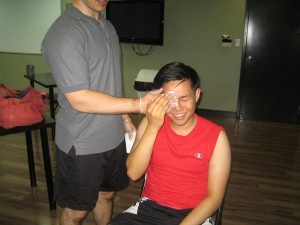A black eye involves bruising to the tissue beneath the skin that surrounds the eye. This injury is typically due to a direct blow to the face such as a punch or accident such as falls. Oftentimes, a black eye can occur after a cosmetic surgery to the face such as a nose operation or facelift.
The area surrounding the eye becomes bluish or purplish in appearance since the small-sized blood vessels beneath the skin burst and blood leaks out into the surrounding soft tissues. In most cases, the skin can be swollen and sore and the individual will find it hard to completely open the eye. The vision might be temporarily blurred and accompanied by a headache.
What to do for a black eye?

A black eye is not considered serious and can be managed at home if there are no indications of a severe injury. After a span of a few days, the inflammation surrounding the eye starts to subside and the bruise will become brownish-yellow before eventually disappearing. Just like with another bruise, a black eye typically takes about 1-2 weeks to fully heal.
Self-care measures for black eye
There are various ways to minimize the symptoms of a black eye. Initially, you can gently apply an ice pack on the skin surrounding the eye as soon as possible after the injury. An alternative is a bag of frozen vegetables that is wrapped in a clean cloth or towel. The cold works by numbing the pain and reduces the swelling.
During the first day, apply the ice pack for 15-20 minutes an hour every hour. Pain medications such as ibuprofen or paracetamol can be given to reduce the pain. Do not use aspirin since it can aggravate the bleeding.
A doctor should be consulted if the swelling and pain is severe or does not go away or the area is red, warm or drains pus.
When to seek further care
Bring the individual to the nearest emergency department for the following:
- If the individual struck his/her head and have two black eyes (this indicates a form of head injury called as basilar skull fracture)
- Double vision or loss of vision
- Loss of consciousness after sustaining a direct blow to the head
- There are other symptoms of a severe head injury such as a severe headache, memory loss, drowsiness, vomiting or seizures
- The eye cannot be moved
- If an object has pierced the eye or something embedded in it
- Eye is cut or there is blood in the eye
- Indications of a serious eye injury
- Individual currently uses blood-thinning medications such as aspirin or has a bleeding disorder such as hemophilia
Always bear in mind that any of these can indicate that there is a serious injury and a need for further assessment as soon as possible.
